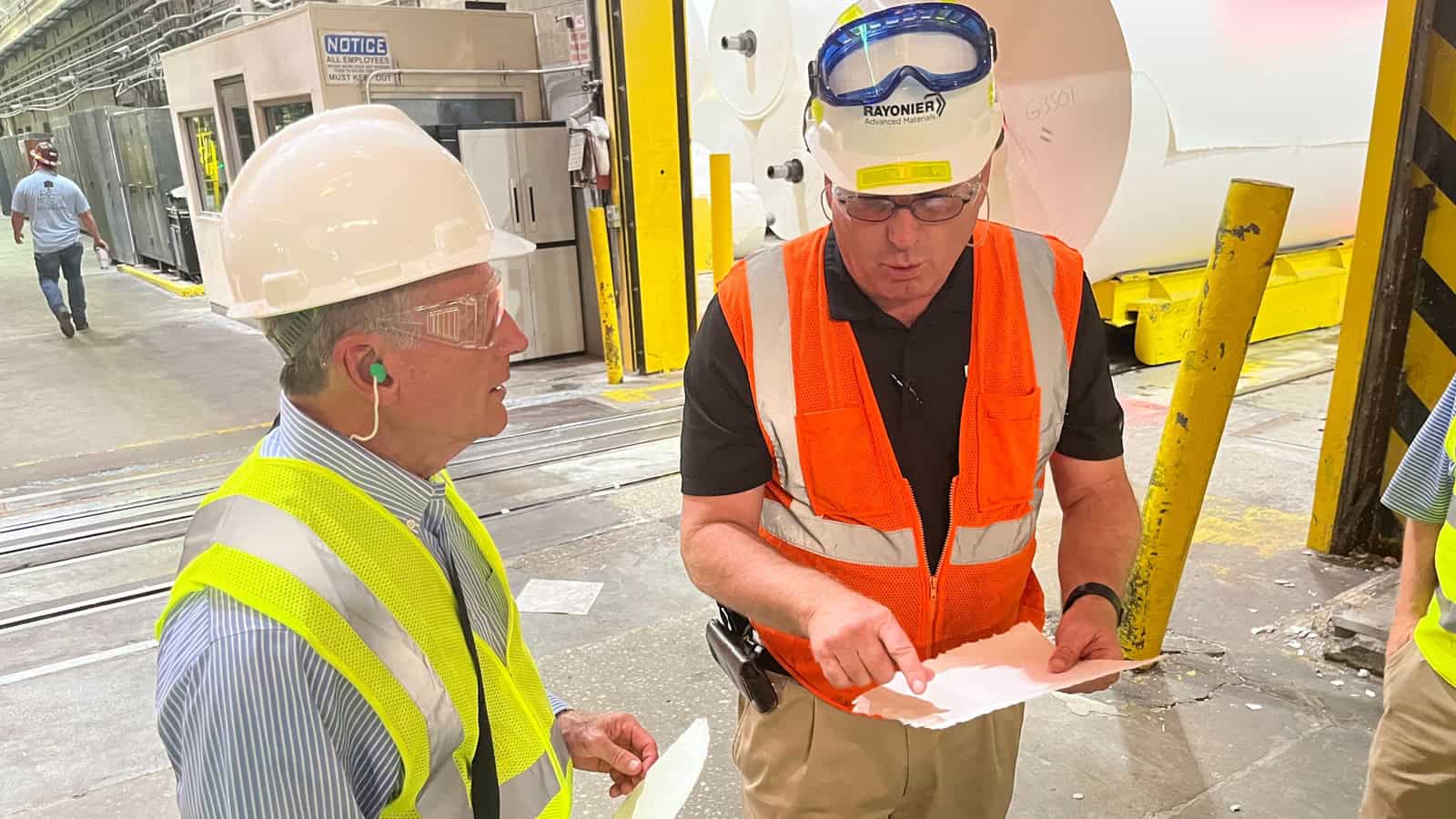Rep. Buddy Carter Calls for PBM Reform, Tax Action at RYAM

Rep. Earl L. “Buddy” Carter (R-GA), a staunch advocate for health care reform and a community pharmacist by profession, visited RYAM’s manufacturing facility in Jesup, Georgia, in August to discuss manufacturers’ health care and tax policy priorities.
During the visit, Rep. Carter emphasized the critical need for pharmacy benefit manager reform as well as tax policies that support manufacturers’ growth and competitiveness.
The visit: Clay Bethea, RYAM’s Jesup plant general manager and vice president of U.S. wood procurement, led Rep. Carter on a tour of the cellulose specialties manufacturer’s facility, where he observed how pulp is dried and finished into sheets and rolls. Bethea highlighted the significant challenges the company faces due to rising costs in health care, particularly those driven by PBMs, and the looming expiration of key tax provisions in 2025.
- “We are proud to be a part of this community, creating jobs and driving economic growth,” Bethea said. “However, the rising costs of health care, particularly due to PBMs, and the uncertainty around critical tax provisions like R&D expensing and accelerated depreciation, are growing concerns for both our business and our employees. Reforming PBMs and maintaining tax policies that allow us to invest for the future are crucial to our ability to remain competitive globally.”
PBM reform: Rep. Carter has long been vocal about the need to hold PBMs accountable for their role in inflating health care costs.
- “PBMs have become powerful middlemen, often driving up drug prices while squeezing independent pharmacies out of the market,” Rep. Carter said during the tour. “It’s time for Congress to bring transparency and fairness back to the system.”
- Carter has introduced and supported several pieces of legislation designed to reform PBM practices, including a bill aimed at delinking PBM compensation from drug prices, improving PBM payments to pharmacies and increasing transparency.
Tax challenges: In addition to health care, Rep. Carter addressed the pressing issue of preserving tax reform.
- “The expiration of accelerated depreciation, R&D expensing and favorable tax rates could significantly hamper the manufacturing industry’s ability to grow and remain competitive globally,” Rep. Carter warned.
- “These tax provisions have been crucial for manufacturers like RYAM, enabling them to make significant investments in their operations and workforce. Losing them would not only impact these companies’ ability to innovate but also jeopardize jobs and economic growth in communities across the country.”
NAM in action: The NAM has long advocated for both PBM reform and the preservation of essential tax policies that drive the manufacturing industry.
- “PBMs are a significant driver of the rising costs of health care, and reform is essential to ensure that manufacturers can provide affordable benefits to their workers,” said NAM Vice President of Domestic Policy Charles Crain.
- “Congress also needs to act with urgency to prevent devastating tax increases scheduled for next year that will impact manufacturers across the country.”
The state-level view: Lloyd Avram, president and CEO of the Georgia Association of Manufacturers, echoed Rep. Carter’s concerns.
- “Manufacturers across Georgia are facing unsustainable health care expenses, and the uncertainty surrounding federal tax provisions only adds to the challenges,” Avram said. “Action on PBM reform and tax policy is essential to helping our industry remain competitive and continue providing good jobs in our communities.”
The bottom line: “Reducing health care costs and increasing transparency in the PBM system are crucial steps in lowering the overall cost of doing business in the U.S.,” said Rep. Carter. “However, to truly compete in the global economy, it’s important that we preserve the policies that have empowered manufacturers to innovate, expand and sustain jobs. Otherwise, the U.S. risks becoming a less attractive place for manufacturing investment, ultimately threatening our economic leadership on the world stage.”
